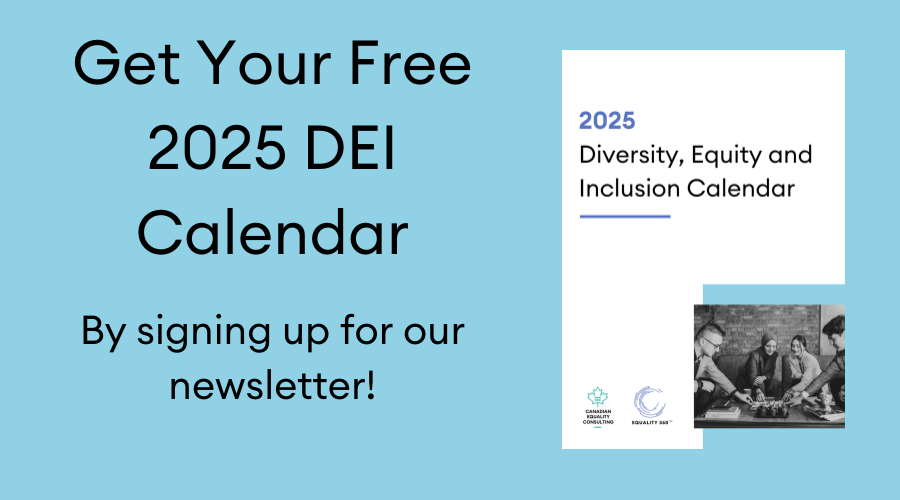
Reflecting on GBA Plus 2024!
Over two days in March, individuals, and organizations from across Canada gathered online to learn the ins and outs of GBA Plus and how it can be integrated into workplaces in all sectors and of all sizes.
Gender-Based Analysis Plus, or GBA Plus as it is commonly known, is a leading framework to help organizations and policy makers better understand the needs that individuals who represent all identities have when accessing programs, policies, or procedures whether those be large-scale, pan-Canadian, government managed benefits programs or internal policies, such as human resource policies, for a small emerging organization.
Developing GBA Plus skills and taking GBA Plus training is an excellent next step in advancing your diversity, equity, and inclusion (DEI) journey and can enhance traditional DEI training programs.
Key Takeaways from the 2024 GBA Plus Conference
As in years past, this year’s 2024 GBA Plus Conference brought together the GBA Plus community to shine a light on GBA Plus best practices, provided opportunities for joint problem-solving, and demonstrated how GBA Plus approaches can create noticeable impact in policy development areas from traditional social policy applications to more creative applications such as assessing the design of new Coast Guard vessels or engaging GBA Plus principles and approaches in engagement design and non-profit data gathering.
Key takeaways from this year’s conference include:
- Nothing is neutral. Groups of people will be affected differently in all systems. Recognizing this reality is the first step in undoing systems of oppression.
- Building inclusive cultures requires us to first build community. Building community and engaging in storytelling helps us to not only gather more data than we otherwise would, but also to avoid tokenism when we seek to expand the diversity of our communities.
- GBA Plus requires us to look at the whole person and the social contexts in which they live. Assessing impacts, identities, and barriers in isolation misses that nature of intersectionality and results in continued gaps in access.
- GBA Plus needs to be integrated into the whole organizational culture. This requires a sustained effort and a focus on tangible actions rather than rhetoric or performative action. Culture change does not happen overnight. Transforming organizational culture is a gradual process that requires patience and persistence.
- Sustainable GBA Plus implementation needs research and data, community building, transparency in decision-making, sharing stories and lived experiences, and taking tangible action to improve outcomes and reduce barriers to access.
- GBA Plus frameworks do not have to work in isolation. Rather, GBA Plus can work in conjunction with Appreciative Inquiry approaches, which ask us to look at communities and equity-denied groups through the lens of current strengths which can serve as a launch pad for future successes.
Exploring Intersectionality: the Layers of our Identities
Intersectionality is the concept that all oppression is linked. More explicitly, the Oxford Dictionary defines intersectionality as “the interconnected nature of social categorisations such as race, class, and gender, regarded as creating overlapping and interdependent systems of discrimination or disadvantage.”
Without an intersectional lens, efforts to tackle inequalities and injustice are likely to just end up perpetuating systems of inequalities.
Intersectionality is the acknowledgement that everyone has their own unique experiences of discrimination and oppression, and we must consider everything and anything that can marginalize people – gender, race, class, sexual orientation, physical ability, etc.
First coined by Professor Kimberlé Crenshaw back in 1989, intersectionality was added to the Oxford Dictionary in 2015 with its importance increasingly being recognised in the world of women’s rights and other social justice movements.
When we consider our own identities and experiences, we can identify areas where we might have most social privilege and areas where we face systemic oppression. For example, a middle-aged, white, cisgender queer woman who has multiple disabilities may face challenges with accessing quality health care, maintaining steady employment, and may be at risk for discrimination or harassment based on their sexual orientation. On the other hand, that same individual also benefits from having white skin and from being cisgender.
But intersectionality asks us to look deeper at how individual identities merge and transform in the face of social systems of oppression and power. For example, while the individual noted above may face some challenges because of her gender, the reality is those challenges will be fundamentally different than what a Black woman, an Indigenous woman, or a transwoman may face, although all are women. The intersection of race, Indigeneity, and gender identity shift how an individual is perceived experiences from one woman cannot be assumed to be the same as those faced by all women.
Intersectionality needs us to understand how the systems in which we all live privilege, ignore, or oppress various identities and how those experiences transform with various combinations. Imagine a Rubix cube. Each Rubix cube may have the same colours, same number of moving pieces, same objective, but how you get there will depend entirely on where the colours are when you pick up the cube. No two cubes will be identical nor will the path to solve the puzzle. In short, we’re not much different than a beloved ‘80s toy.
Embracing Intersectionality: Tools in our Toolkit
Embracing intersectionality requires us to ask ourselves who is being left out? Whose needs are not being met? Whose outcomes are worse because of a barrier?
There are several tools available to help us navigate these challenges.
- Celebrate Diversity and Intersectionality | When you see diversity as an addition rather than a challenge to be overcome, you open the door to knowledge sharing and a deepening understanding of the human experience.
- Embed Intersectionality and Equity into Policy Development | All policies, from small organizational IT policies to large, universal government programs can benefit from applying an equity or GBA Plus lens. Asking ourselves:
- What assumptions am I making about this policy and its application?
- Who is being left behind by the current approach?
- Who can I consult with to get more information about identity-based needs?
- What data is available to support my assumptions and strengthen my recommendations?
- How can I apply equity – a process of ensuring individuals are provided with the tools, resources, and supports needed to overcome their unique and individual barriers to access.
- Build a culture of workplace inclusion. Workplaces that value the input of differing perspectives and experiences tend to have workforces that are more confident in their recommendations, can better identify and solve problems, and build a sense of community and camaraderie among their team members.
Why Every Organization Needs Diversity and Inclusion Training
Creating a culture of inclusion and equity doesn’t happen by chance. Creating desirable workplaces requires effort, knowledge, and time. One of the best ways to begin your journey to equity and inclusion is to ensure your team… your whole team has the skills and knowledge necessary to create and maintain the culture you want to foster.
Without providing the skills necessary, most attempts at improving equity and inclusion will fall short. They’ll either be performative in nature, not addressing systems of oppression; they’ll only meet the needs of a few individuals, missing the unique challenges of various identities; and staff will burn out as they won’t know how to sustain this work over the long term.
To set your organization off on the best foot, investing in DEI training that addresses equity in policy development, intersectionality, and inclusive workplace cultures will give your team the best chance of making lasting and sustainable changes. Canadian Equality Consulting can help you with all your organizational training needs. Canadian Equality Consulting is also a leader in GBA Plus training and assessments. If you’re ready to make the leap to a more equitable organization, CEC can help you on that path.

